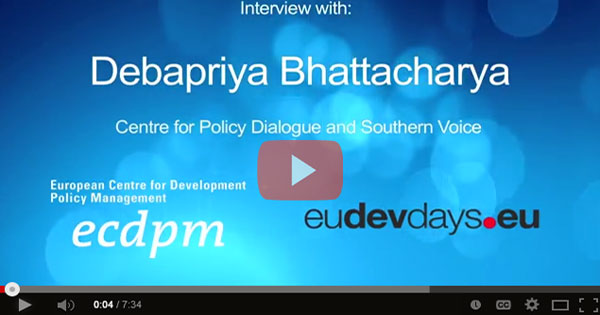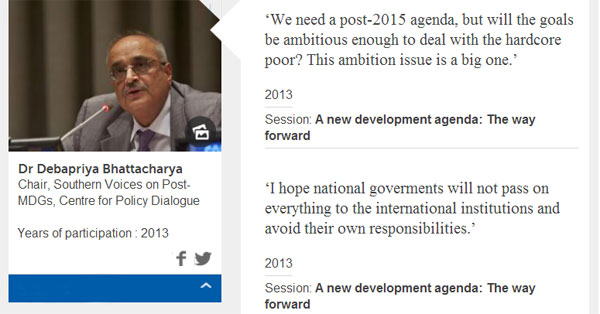Dr Debapriya Bhattacharya, CPD Distinguished Fellow participated in the closing session of the European Development Days in 2013 (EDD13), which was dedicated to the theme “A New Development Agenda: The Way Forward,” organised by the European Commission, during 26-27 November 2013, in Brussels, Belgium.
The theme and focus of the eighth edition of European Development Days in 2013 (EDD13), was ‘A Decent Life for All – building a consensus for a new development agenda’. EDD13 in general and the Closing Panel in particular focused on the challenges raised by the Report of the High-Level Panel of Eminent Persons on the Post-2015 Development Agenda, titled ‘A New Global Partnership: Eradicate Poverty and Transform Economies through Sustainable Development’, presented to UN Secretary-General Ban Ki-moon on 30 May 2013.
‘We need a post-2015 agenda, but will the goals be ambitious enough to deal with the hardcore poor? This ambition issue is a big one,’ Dr Bhattacharya addressed the closing session as saying.
‘I hope national governments will not pass on everything to the international institutions and avoid their own responsibilities.’ he added.
Low-income countries ‘lack the resources to participate effectively’ in the negotiations over a post-2015 agenda, warned Debapriya Bhattacharya, Chair of the Southern Voices on Post-MDGs, Bangladesh. He worried whether the post-2015 agenda will be ambitious and balanced enough. ‘There will be hard choices and painful trade-offs,’ he said.

Speakers and the audience generally agreed that a new development agenda is needed for 2015 because the existing UN Millennium Development Goals (MDGs) are set to expire in 2015. While the eight MDGs have been very useful in advancing poverty reduction and improving human well-being, progress toward their fulfilment has been spotty and new realities require some new approaches going forward. However, even while a new agenda is being negotiated, strenuous efforts to meet the MDGs should continue.
There was also general agreement that the new development agenda should be universally applicable to all nations, with benefits and responsibilities for rich, middle-income and poor countries, including the BRICS nations – Brazil, Russia, India, China and South Africa. There was further general agreement that sustainable development – development that takes account of planetary resource limitations, environment concerns and climate change challenges – must be linked to poverty eradication in the post-2015 agenda, but that this linkage will require trade-offs and compromises.
The closing session, moderated by Simon Maxwell, Senior Research Associate (former executive director), ODI, comprised the high panel constituted of Ellen Johnson Sirleaf, President of Liberia and a Co-Chair of the UN High-Level Panel on post-2015; Jan Eliasson, Deputy Secretary General, United Nations; Andris Piebalgs, EU Commissioner for Development; Debapriya Bhattacharya, Chair, Southern Voice on Post-MDGs; Winnie Byanyima, Executive Director, Oxfam International; and Paul Collier, Director, Centre for the Study of African Economies, University of Oxford.



